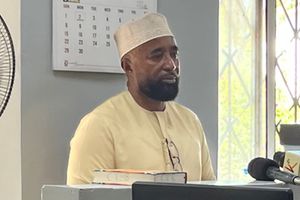Premium
How rushed deals are wasting billions

Road construction. FILE PHOTO | NMG
What you need to know:
- Ministries, agencies and State corporations uncontrolled appetite for mega projects continue to expose taxpayers to losses through badly thought contracts even as questions abound on the viability of such plans.
- And as new projects continue to be rolled out in various sectors across the country, it appears that those who win government tenders are almost guaranteed of billions of shillings from the weak, disorganised and inefficient State processes that most of the time fail to stick to the contract.
- Kenya’s landscape is dotted with projects whose delivery was delayed or even shoddily done.
Ministries, agencies and State corporations uncontrolled appetite for mega projects continue to expose taxpayers to losses through badly thought contracts even as questions abound on the viability of such plans.
And as new projects continue to be rolled out in various sectors across the country, it appears that those who win government tenders are almost guaranteed of billions of shillings from the weak, disorganised and inefficient State processes that most of the time fail to stick to the contract.
Kenya’s landscape is dotted with projects whose delivery was delayed or even shoddily done. Yet, some contractors still keep winning tenders, walking away with money for work not done.
Barely two weeks ago, Petroleum and Mining Cabinet Secretary John Munyes told Parliament that the government will have to pay a Chinese firm Sh2 billion following the change of mind on which company should undertake the much-awaited mineral mapping survey.
“At the time Geti was put on hold, we already had a running contract with them. A contract is binding and, therefore, we have to pay at the end of the day,” said Mr Munyes.
This captures a glimpse of losses that taxpayers are going to bear after the government froze the deal with Geological Exploration Technology Institute (Geti) opting for the survey to be done by local geologists and the National Intelligence Service.
Kenya had inked a commercial contract with Geti in May 19, 2014 but the process has been dragging on owing to missed reactions on the safety and integrity of the report, which is supposed to disclose location, type and estimated value of minerals in the country.
Delayed implementation of such projects yet contracts have been signed, points to a State machinery that lacks a solid team to plan before putting pen to paper, according to a public policy and economic analyst Robert Shaw.
“Government does not have a strong legal team specialising in supporting the tendering process. Companies are more skilled than government and capitalise on non-watertight tenders to their advantage,” says Mr Shaw.
Another Chinese contractor, Anhui Construction Engineering Group Ltd in a joint venture with China Aero-Technology International Engineering Corporation, was paid Sh4.3 billion yet no work had been done on the cancelled Greenfield Terminal at Jomo Kenyatta International Airport.
This was in the hands of Kenya Airports Authority (KAA). The payment was in addition to Sh413.5 million paid to consultants and law firms. The project was to be implemented on design-and-build but was terminated on grounds that the contract was void from the beginning.
The National Social Security Fund (NSSF), another State entity, risks costing taxpayers Sh6.9 billion if Chinese contractor, China Jiangxi International, is granted its prayers to be compensated the sum due to the stalled construction of Nairobi’s Hazina Trade Centre. The claim is above the original contract price of Sh6.7 billion.
The same firm wants NSSF to pay it Sh2.1 billion as compensation for the stalled Phase six of Nyayo Estate Embakasi project.
It is alleged that the fund’s board entered into a contract with the Chinese firm without securing the necessary approvals from City Hall, leading to a stalled project.
“You jumped the gun. You engaged a contractor without securing change of user. We want proper and detailed submissions on this project,” Public Investments committee chairperson Abdulswamad Nassir told NSSF in May.
The same month, three road contractors, including two Chinese firms, slapped Kenya National Highways Authority (KeNHA) with a Sh6 billion bill that arose from variations of their contracts and delayed payments by the Treasury.
In July, a standoff in Turkana stopped an oil evacuation exercise, costing taxpayers Sh1 billion in compensation to companies involved. Locals stopped the early oil export programme demanding security and their share of jobs and tenders.
The trend continues from last year when the Lake Turkana Wind Power also hit the Treasury with a Sh14.6 billion bill for failure to finish the transmission line from its Marsabit wind farm to Suswa. Treasury has paid Sh5.7 billion while Sh9.36 billion is to be paid over a six-year period.
Treasury noted in September that without any methodological guidance on efficient public investments, the basis for consistent and comprehensive project appraisal is missing. It added that the absence of a public investment management framework opened room for shoddy projects.
“The result is a bloated project portfolio, unpredictable funding, stalled projects, and inflated costs contributing to the under-execution of budgets and delayed translation of the investment in projected economic growth,” noted Treasury.
Apart from proposing a framework to guide funding of projects, Treasury’s Rotich now wants State contracts to be subjected to tight checks before a final decision is made to sign them, especially when external financing is involved.
“Kindly note that the check-list of mandatory requirements are critical in mitigating the government against any potential financial risks of paying commitment fees and other charges on loan amounts due to delays in commencement of project implantation,” Mr Rotich says in the memo.
But before such measures happen, wastage and regrets remain evident. Kenya Revenue Authority (KRA), finds itself stuck in a Sh17 billion excise tax stamps supply agreement with a Swiss firm that has no provisions for compensation in the event of a breach of the contract.
In October, Parliament described the 2015 contract as skewed since it only ties KRA and not the Swiss firm to make reimbursement in the event of partial or full termination of the contract.
“I raised this matter when I was in Switzerland recently and the Swiss company said the contract is watertight on their part. They are convinced that even if MPs amended the law to exclude some excisable items, they are home and dry,” PIC chairman, Mr Nassir said in Parliament.
According to Mr Shaw, the government will have to strengthen its tendering team or always be on the losing end when seated at the negotiation table.
“Government must train its personnel to have watertight tendering process. But sometimes it is also the issue of corruption,” says Mr Shaw.
“Quite often, there is a deliberate omission in government agreements, leaving a hole for some costly claim.”
And despite Energy Regulatory Commission promising Kenyans cheap power, the country is still stuck with expensive power purchase agreements signed in the past, without offering a favourable exit clause.
In May, Energy CS Charles Keter said that some of the thermal power plant Power Purchase Agreements (PPAs) have financial and legal implications and will only be terminated once they reach end of contract.
Izael Da Silva, the chairman of the task force formed in 2016 to assess these agreements returned a harsh verdict in August this year.
“We are proposing termination of only those thermal power plants whose cost of termination is less than maintaining them until the end of their agreements,” said Mr Izael.
The earliest some of the contracts for thermal electricity expire is 2023 when Tsavo Power’s and Rabai Power’s agreements end. Gulf Power, Triumph Power and Ibera Africa’s contracts expire after 2031.
And many more similar losses are set to hit counties, according to Mr Shaw, who adds that devolved units are poised to be the next playing grounds for firms that want to make billions out of government inefficiencies.




